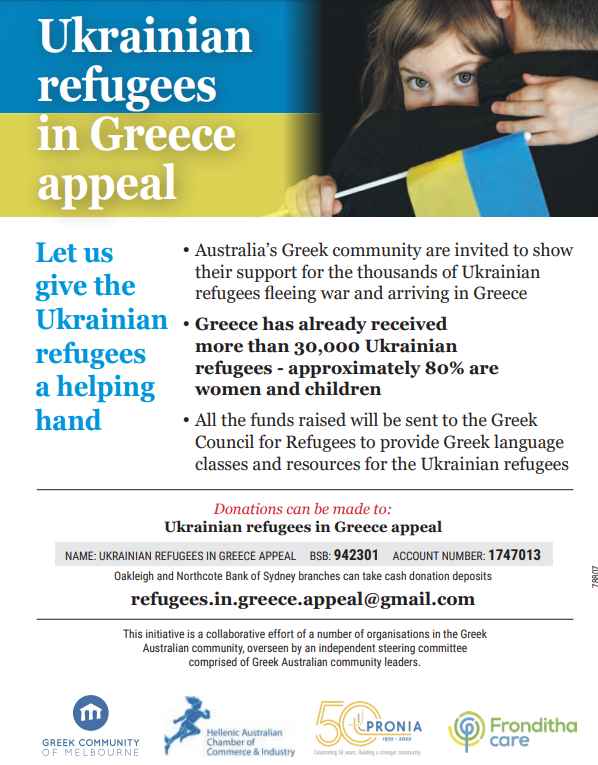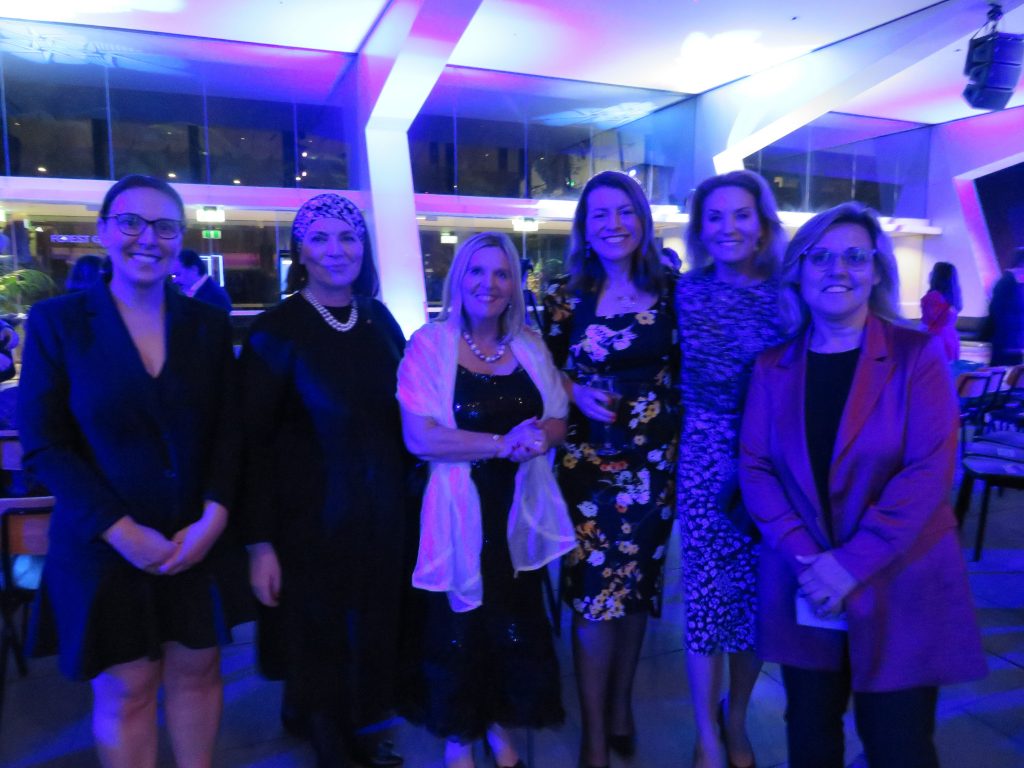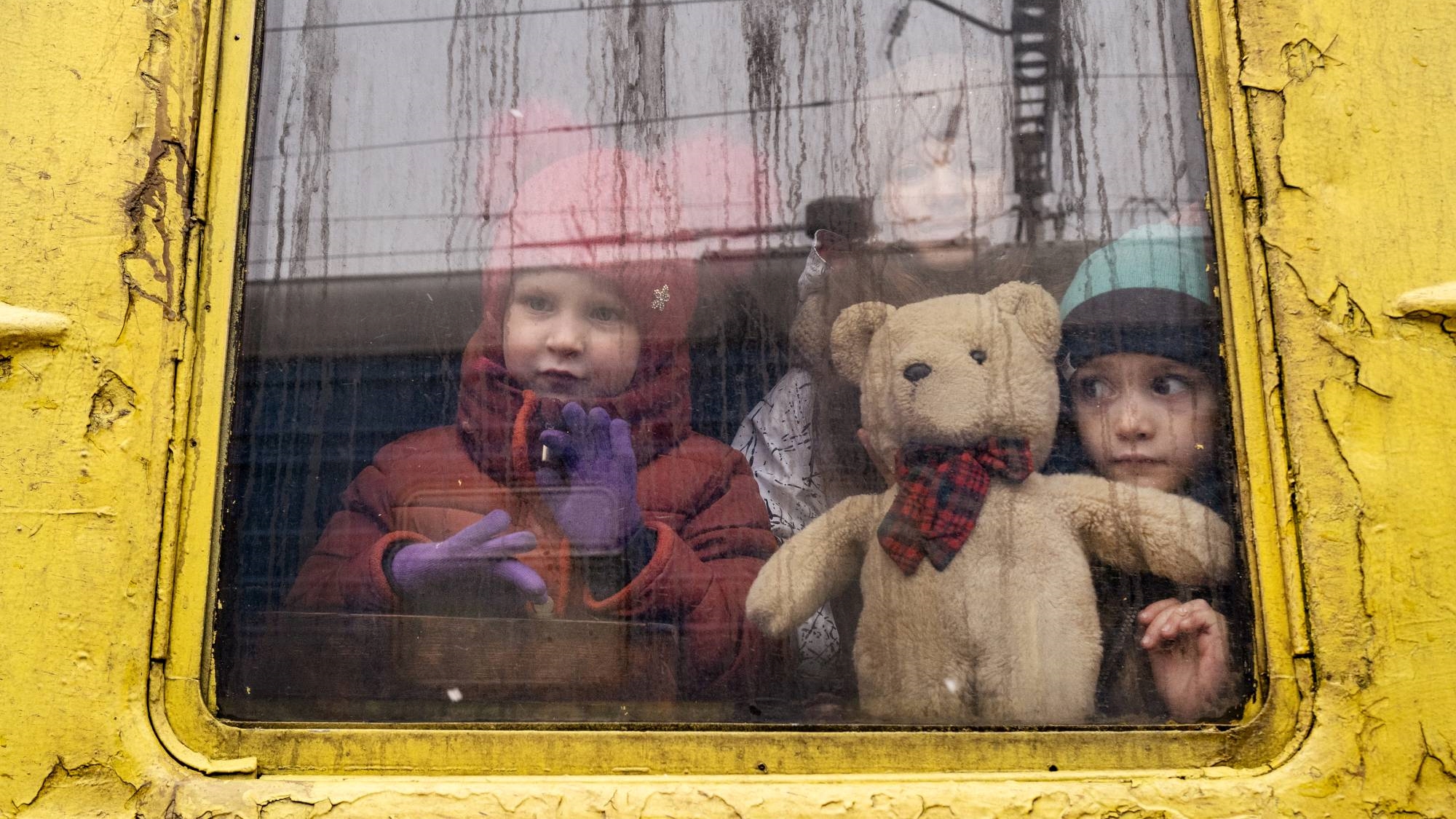By Mary Sinanidis.
“More than 6 million Ukrainians have left their country, so it’s possible, if the war continues, that many more will go to Greece,” Victoria’s former health minister Jenny Mikakos told The Greek Herald.
Watching the drama unfold, she contacted her friend of 20 years, former state director of UnitingCare Stephanie Lagos, who until recently was the social programs coordinator at the Greek Council for Refugees (GCR). Ms Mikakos gauged the situation to see what Greek Australians could do to help and swiftly got to work laying the groundwork for the Ukrainians in Greece Appeal, a fundraiser launched last week to support the GCR in offering Greek language classes and resources to Ukrainian refugees of all ages.
“Once the children enrol in mainstream schools, they get help with homework and tutoring so they don’t drop out,” Ms Mikakos said.
“They will also run summer camp programs and activities during the Greek school holidays. Children fleeing war also need psychologists and social workers to cope with the trauma they have experienced.”
The fundraising framework was organised at the same time as the launching of the Open Horizons display of works by the National Archaeological Museum (NAM) at the Melbourne Museum which Ms Mikakos had been pivotal to bringing to Australia.
“What’s next?” we asked her at the time.
“I’ll have something to announce soon,” she told The Greek Herald.
READ MORE: Ancient Greek statues ‘speak’ of migration and multiculturalism at the Melbourne Museum
Key stakeholders of the appeal heading Greek organisations were present that night, and a committee has been established. It includes Greek Community of Melbourne President Bill Papastergiadis, Hellenic Australian Chamber of Commerce and Industry Board Chair Fotini Kypraios, PRONIA President Kris Pavlidis and Fronditha Care President Jill Taylor-Nikitakis.
“The Greek Herald is proud to partner with Ms Mikakos and the GCR in this appeal,” The Greek Herald’s publisher, Dimitra Skalkos, said.

Like Ms Skalkos, most of the stakeholders who have partnered with Ms Mikakos are women. A fitting proportion, especially when bearing in mind that 80 per cent of the 30,000 Ukrainian refugees which have crossed Greece’s border as at late May have been women and children. It is very likely that these numbers will continue to grow for months, if not years, to come.
READ MORE: ‘People are scared’: Ukraine’s Greek communities in agony as war rages on
Analysts expect that as the Russian military continues its attempt to take control of the Ukrainian territory, long-term resettlement options will need to be found. “It’s possible that many of these people may need to live in Greece for many years, as their homes and cities have been destroyed,” Ms Mikakos said.
Ms Taylor-Nikitakis told The Greek Herald that the fundraising appeal is aligned to Fronditha Care’s values: Do Right, Respect, Inspire Better and Bring Joy. “Our organisation cares for our parents, to provide them the best life in their later years,” she said.
“Our Greek elders came to this country and worked hard to provide their children and further generations a rich, comfortable life without the challenges and hardships they endured. One of the many barriers they had to overcome was not knowing the language, just like the Ukrainian refugees resettling in Greece today.”
Ms Pavlidis said PRONIA’s mandate is “inherently about social justice, welfare and well-being” for all, and for this reason it was a “no brainer” for the organisation to assist in the humanitarian crisis. “This initiative presents an opportunity to demonstrate filotimo to Greece and the Ukrainian refugees without any expectation,” she told The Greek Herald. “After asking ‘How can we help?’ I was invited to the steering committee for the Project.”
She believes that the GCR’s efforts to help the refugees acquire Greek language skills is important for numerous reasons. “Firstly, it enables the critical connectivity and cultural immersion into the Greek culture and society, particularly in such circumstances,” she said. “At a time of crisis one of the first steps to personal recovery is to return to the experience of ‘normalcy’. For the children, this would mean attending school, socialising with peers, feeling a sense of belonging and safety and security.”
Ms Pavlidis said language acquisition will help the children build self confidence and adults to “be better equipped to be gainfully employed and hence develop a sense of independence and self-esteem.”

Mr Papastergiadis pointed to the success of English language courses for Greek Australian migrants introduced during the Whitlam years in the early 1970s, which “had a profound effect on people’s lives”. He hopes that in turn, Greek language programs for refugees in Greece will meet with similar success.
“This initiative, led by Jenny, is timely and deals with the daily needs of the Ukrainians who made the journey to Greece. Language is key to people becoming a part of society,” Mr Papastergiadis told The Greek Herald.
“We can’t have the Ukrainians in Greece living on the fringes of society. They have endured enough with this war and no doubt the trauma of war will be with them for generations. Whatever we can do to ease their life in contemporary Greece is an important step.”
Ms Kypraios said that these language programs “will be integral to helping lead the Ukrainian refugees in Greece to a path of self-determination”, especially following the Greek government’s announcement for 50,000 tourism sector jobs.
In July, Ms Mikakos will visit Greece for a vacation. During this time, she will also meet with the GCR to see first-hand how the program is helping Ukrainians who have fled their country.
Donations can be made to:
UKRAINIAN REFUGEES IN GREECE APPEAL
- BSB: 942301 ACCOUNT NUMBER: 1747013
- Oakleigh and Northcote Bank of Sydney branches can take cash donation deposits.
- For more information contact: refugees.in.greece.appeal@gmail.com

